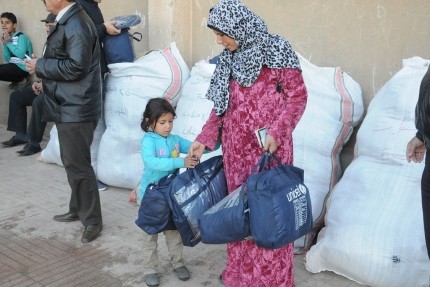
2 February 2016 – With four million Syrian and host community children in need of education and no let-up in sight in the fighting tearing the country apart, the United Nations and its partners are seeking $1.4 billion at a major conference in London on Thursday to save the current youth generation.
“The scale of the crisis for children is growing all the time, which is why there are now such fears that Syria is losing a whole generation of its youth,” said UN Children’s Fund (UNICEF) Regional Director for the Middle East and North Africa, Peter Salama, whose agency is coordinating the ‘No Lost Generation Initiative’.
“As a result of all the work being done by partners and donors, education and protection for children are now being prioritized. But what we must see in London is the step-change necessary to bring all children back to learning; to protect those who are at risk of dropping out; expand safe and inclusive learning environments; recruit and train more teachers; improve the quality of education, and support the development of technical, vocational and life skills opportunities for youth.”
The London conference is being co-hosted by Britain, Germany, Kuwait and Norway, and leaders from more than 30 countries are expected to attend, with the aim of raising new funding to meet the immediate and longer-term needs of those affected by the crisis.
Nearly five years into the Syrian war, some four million Syrian and host community children and youth aged 5-17 years are in need of education assistance, including 2.1 million out-of-school children inside Syria and 700,000 Syrian children in Turkey, Lebanon, Jordan, Iraq and Egypt.
Last year, the combined efforts of Governments and international partners helped more than one million children and youth inside Syria benefit from formal or non-formal learning opportunities. But with no political solution in sight to one of the most brutal conflicts the world has seen in decades, the number of children missing out on an education continues to climb.
Governments at the London meeting will also be urged to put more pressure on parties to the Syria conflict and those who support them to end attacks on schools and other places of learning, in accordance with international humanitarian law.
According to UNICEF, the killing, abduction and arrest of students and teachers has become commonplace, as have arbitrary attacks on schools. About one in four schools cannot be used because they have been damaged, destroyed or are being used as shelters for the internally displaced or for military purposes.
The No Lost Generation Initiative was set up in 2013. By the end of 2015 1.2 million children and youth inside Syria benefitted from improved formal and non-formal learning opportunities and more than 650,788 in Egypt, Iraq, Jordan, Lebanon and Turkey received school supplies or support through cash grants.
GAIN IS COMMITTED TO HELPING 1,000 FAMILIES WITHIN SYRIA. OUR HEARTS BREAK WITH THE DAILY REALITY MANY OF THESE CHILDREN AND THEIR FAMILIES ARE EXPERIENCING.
IF YOU WOULD LIKE TO READ MORE ABOUT OUR WORK, CLICK HERE.
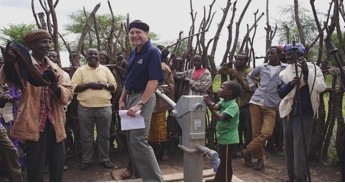
In November 2015, our GAiN Water for Life Initiative Team visited Ethiopia and brought back good news from a poor, remote village in the dry region of Southern Ethiopia – Ame Serba.
A newly-drilled deep-capped well had been finished and the team was there for the dedication.
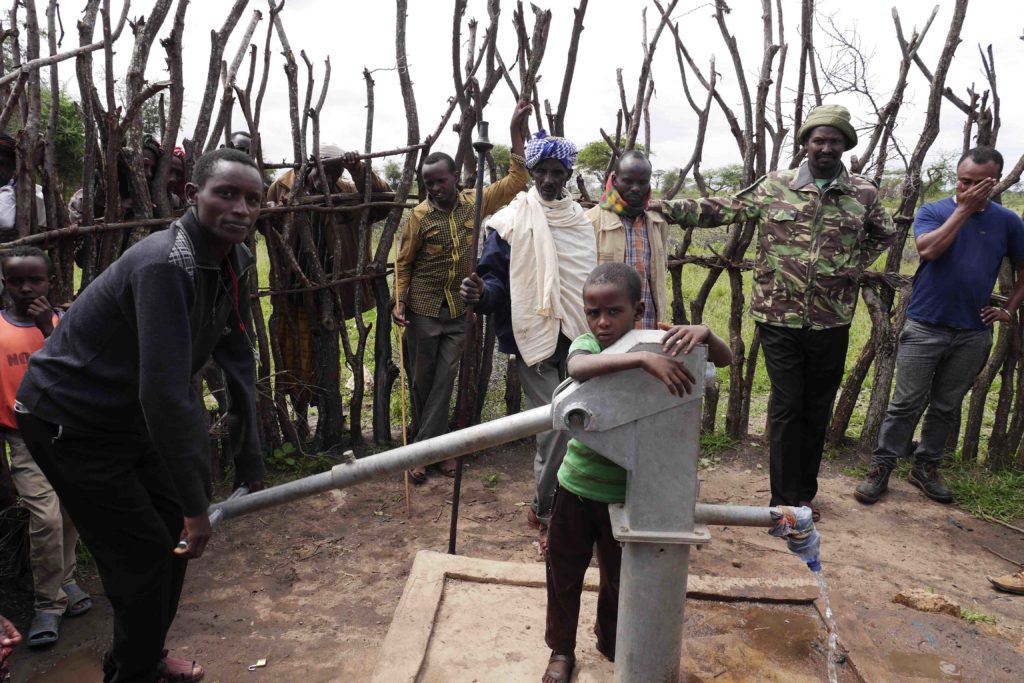
Almost the whole village of goat and cattle herders turned out, dressed in their ceremonial dress to welcome the team and celebrate the new well. Old men came with tall carved sticks–the privilege of village elders, and the women came with festive trinkets in colorful dresses ornamented with gourds.
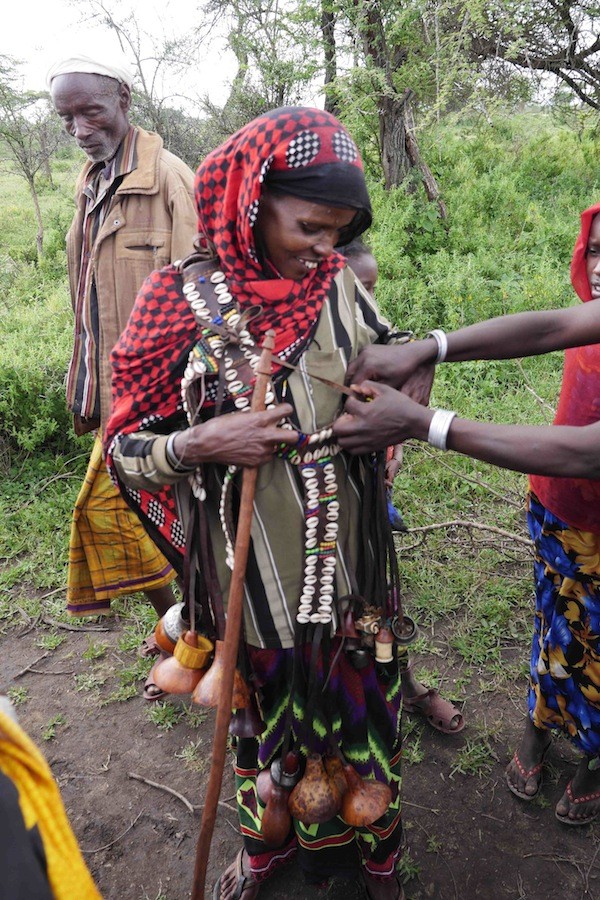
The village elders ceremoniously bestowed Borana turban headdresses on the GAiN staff to welcome them to the village.
The villagers were so overwhelmingly appreciative of the well!
It had changed their lives as a tribe and reduced the premature death of livestock due to water shortage. Women and young girls were unquestionably tasked with fetching water, and it was not uncommon to see girls 10 or 12 years old with large jerry cans strapped to their backs that they carried for long distances. Having the well close by was now saving women and girls precious hours every day. Today, they now use these hours to do more productive work on the farm and in their households, as well as go to school.
Through the partnership with the JESUS Film Church Planting Strategy team, the JESUS Film had also been shown in this village and a new church had been planted. After the dedication, the GAiN team met the new church congregation, which included the leader of the village and many other villagers.
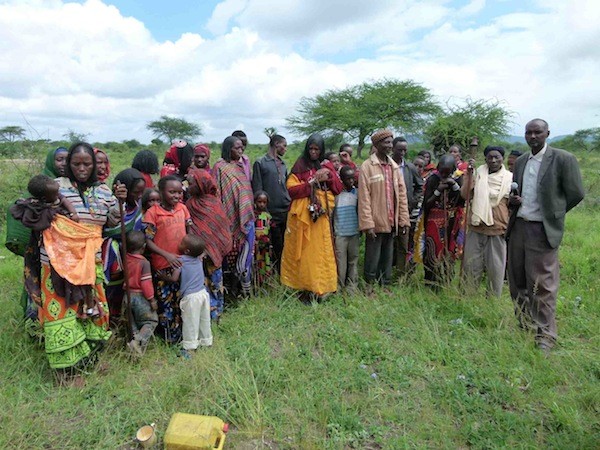
It was so moving for the teams to see, with their own eyes, all those who had been impacted from this partnership and that God’s love had been demonstrated, both in word and deed.
THERE ARE MANY OTHER VILLAGES LIKE AME SERBA THAT NEED BOTH CLEAN WATER AND THE LIVING WATER.
WOULD YOU HELP PROVIDE CLEAN WATER TO VILLAGE?
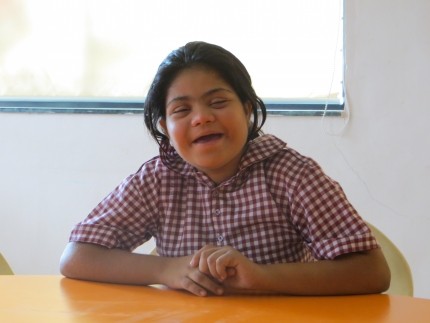
Writen by Mukti’s caregiver – Shruti first came to Mukti Mission five years ago as a small 12 year-old girl with Down Syndrome. She comes from a kind family and has a mother, father, sister and brother. Her parents are farm laborers and when they would go to work, Shruti would be left alone at home. Her parents were worried that as she approached her teenage years, it would be difficult and dangerous for a teenage girl to remain alone at home. There were no special needs schools in any of the local towns surrounding their home. Her family was told about Mukti where there would be the opportunity of an education at the Special Needs School and a safe and loving home with the Violet family.
Mangala, Shruti’s house mother, says that it took Shruti about one month to settle in when she first arrived. She immediately loved school and loves to swing. She enjoys her friends and loves singing, painting and dancing. Mangala recalls that when Shruti first arrived she could only speak a few basic sentences but now she is quite a chatterbox. She and her best friend, Rehka, enjoy playing practical jokes on each other.
It was upon returning from a brief holiday at home that the Violet family noticed that Shruti had lost weight and was weak. Her energy levels were depleted. After further investigation at the Mukti Hospital and then in Pune, Shruti was diagnosed with tuberculosis. Her treatment took place under the care of the doctors and nurses at the Mukti Hospital. Shruti missed her friends and Violet family sisters during this time. She just couldn’t wait to be better and get back to school!
So what a joy it is for me now, some seven months later, to return to Mukti and see Shruti strong, vibrant and healthy. She had returned to school and is continuing to blossom within the safe and stimulating environment that the Violet family and the Special Needs School provides. The love and dedication of her housemother, Mangala and caregiver Martha, ensure that her cheeky little giggle and smile remain firmly in place.
Last evening, I was privileged to join the family for their daily hour of praise and worship and prayer. Shruti was enthusiastically singing and clapping along with the girls. During the week, the girls have been writing and trying to memorize the theme of the fortnight from the Special Needs School which is “I am fearfully and wonderfully made”. I reflected on how precious Shruti is to God and how delighted He must be to see her fully restored to health and able to sing praises once again.
Finally, as I was leaving the family, I asked one of her sister’s what she thinks of when she thinks of Shruti. She said, ”beautiful”!
WOULD YOU STILL LIKE TO SEE THE LIVES OF OTHER CHILDREN IMPACTED JUST LIKE SHRUTI’S LIFE WAS?
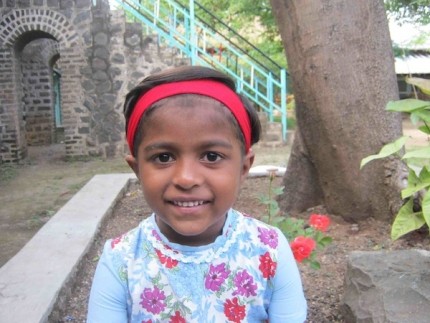
Stuti comes from a volatile background. Although her parents are Christians, their family life was not filled with love. Her father is a day labourer who seeks to provide for his family with a very small wage. Stuti’s mother was unhappy with the situation.
Her parents would fight and with each voicing their opinion but they never compromised. Stuti’s parents had serious problems with their relationship and her home life became filled with turmoil. Instead of trying to find common ground, Stuti’s mother began to spend time outside of the home.
After a while, she decided that she wanted her freedom and did not want the responsibility of raising Stuti and her two big brothers. As a result, Stuti’s mom deserted her family and her parents were then divorced.
Stuti and her brothers still needed to attend school but their father could not work and take care of them at the same time. Stuti’s brothers were put into a boys’ hostel and her father brought her to Mukti.
Stuti was only five years old when she came to Mukti Mission and lived in the nursery. Because of the trauma in her home, Stuti was a very quiet little girl. When she first arrived, she sat by herself and did not mix with others.
Her housemother lavished attention and encouragement on Stuti. Now when asked why she likes to live at Mukti she said, “because my friends are here”.
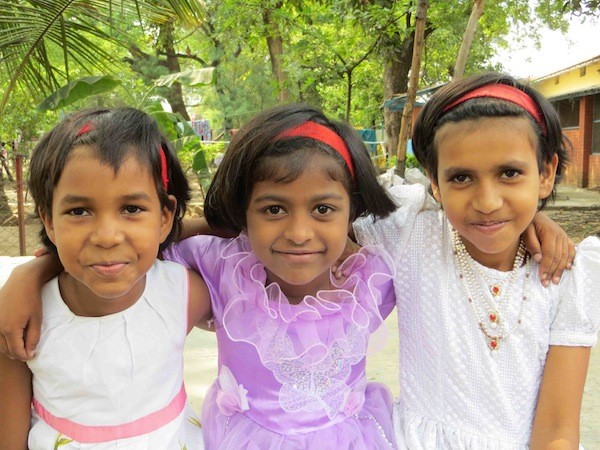
She is still a shy and quiet girl but smiles most of the time. Her favourite game to play with friends is ligori – an Indian game with tiles and a ball.
One day her father came to visit. Stuti came to meet him. He noted, “my daughter is different”. He said, “She used to sit quietly most of the time. She must be happy here.” He was delighted that she was doing well. He saw that she was smiling and peaceful. Although Stuti enjoyed her father’s visit, she felt comfortable with being at Mukti and answered her father with, “Bye, come back again!”
Stuti continues to thrive at Mukti. She has a lovely, quiet countenance. She had the privilege to act as a flower girl in a Mukti wedding. She loved dressing up and carrying flowers.
Stuti enjoys her new home at Mukti. She has come through the turmoil and found a secure place to grow up. Her rough beginning was used to mold her into a peaceful young girl.
WOULD YOU LIKE TO HELP MORE CHILDREN LIKE STUTI?
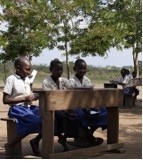
The village of Namauni, located in Tanzania, was able to build a teachers house at the school with the coming of the deep-capped water well.
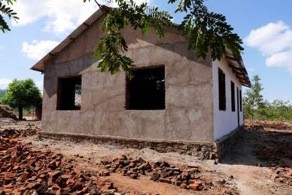

The school and teacher’s buildings were constructed with small clay bricks, but there were no water sources anywhere near the school, which made construction difficult and costly.
With the well nearby, the construction of the buildings was made much easier. In fact, the well brought down the going cost of bricks from 50 Tanzanian Schillings apiece to 30 Tanzanian Schillings apiece, all because water was readily accessible to make the bricks. The village also expects a housing boom in the near future, in large part because there is a nearby source of clean, disease-free drinking water. Having a nearby source of water will also increase the productivity of needed bricks.
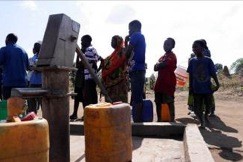
Perhaps the greatest impact is in the lives of the children; particularly the girls. Instead of using valuable time to collect water, they can now spend that time at school getting an education as well as in other village activities.
WOULD YOU LIKE TO HELP OTHER VILLAGERS EXPERIENCE THE SAME TRANSFORMATION IN THEIR VILLAGE?

The village of Namauni, located in Tanzania, was able to build a teachers house at the school with the coming of the deep-capped water well.
The school and teacher’s buildings were constructed with small clay bricks, but there were no water sources anywhere near the school, which made construction difficult and costly.
With the well nearby, the construction of the buildings was made much easier. In fact, the well brought down the going cost of bricks from 50 Tanzanian Schillings apiece to 30 Tanzanian Schillings apiece, all because water was readily accessible to make the bricks. The village also expects a housing boom in the near future, in large part because there is a nearby source of clean, disease-free drinking water. Having a nearby source of water will also increase the productivity of needed bricks.
Perhaps the greatest impact is in the lives of the children; particularly the girls. Instead of using valuable time to collect water, they can now spend that time at school getting an education as well as in other village activities.
WOULD YOU LIKE TO HELP OTHER VILLAGERS EXPERIENCE THE SAME TRANSFORMATION IN THEIR VILLAGE?
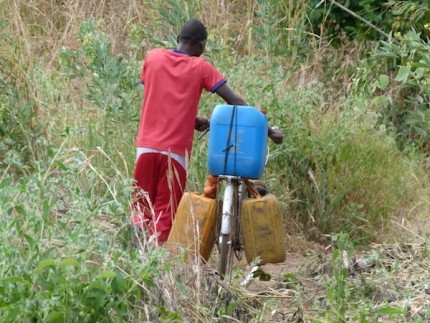
The village of Rweje in Tanzania had the most number of buckets and jerry cans lined up at a water well that our Water for LIfe Initiative team had ever seen.
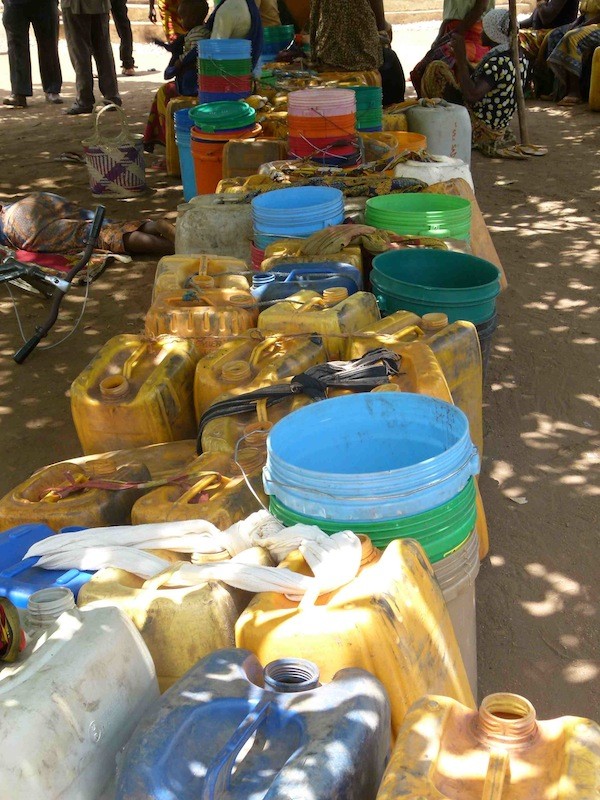
In fact, they lost count after 200!
It turns out that four villages were getting clean water from this one well.
Because there were so many people depending on this well, the borehole committee set certain days for each village to come to get water to try to reduce the pressure on the well.
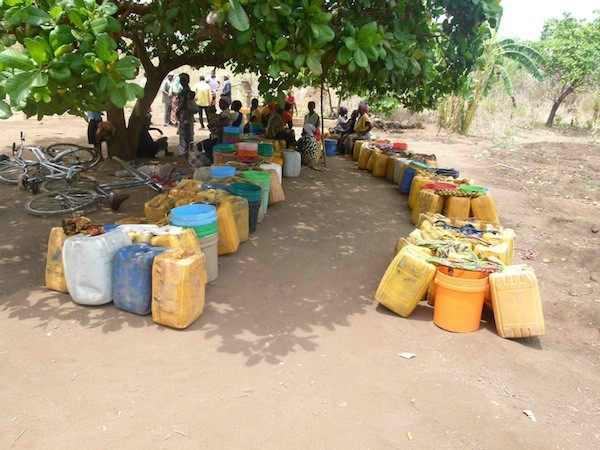
Before this water well was provided, women had to spend the whole day walking as far as five kilometers and waiting in a long lineup for their turn to get one bucket of water.
The borehole committee was very organized. They issued receipts for each bucket of water sold so they could account for all the funds collected. Plus, they even had a sign posted with all the policies such as
- opening and closing times,
- everyone must get a receipt,
- villagers must take good care of the pump and wait their turn in line, and
- each village must come on their designated day to get water.
The committee has collected 6,000,000 Tsh ($3700 CA) in five months of operation, so it has become a big revenue generator for the village. The village decided to use some of the funds to complete the roof on a school that the local government started but did not finish.
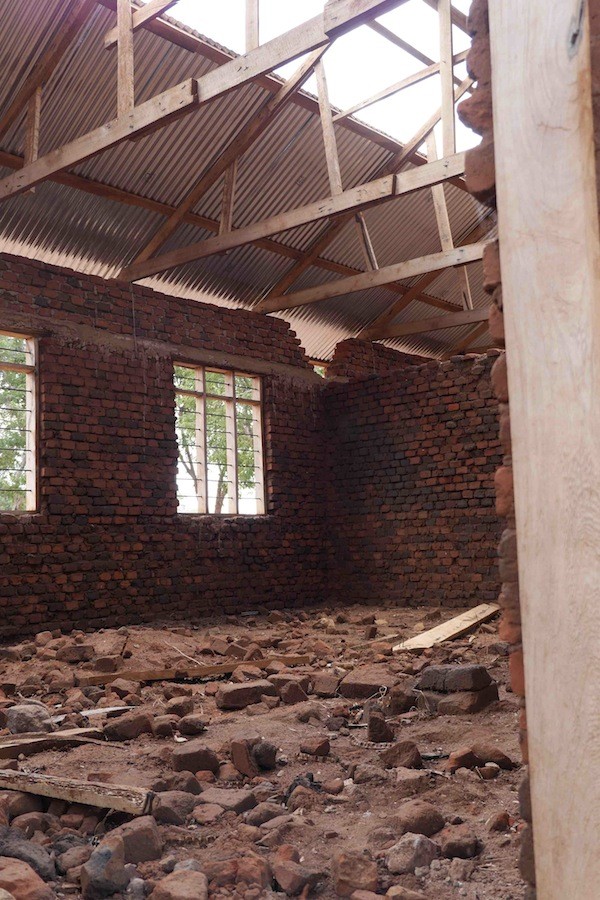
With the extra money from the well, they also had plans to complete the classrooms, one at a time as they have the funds.
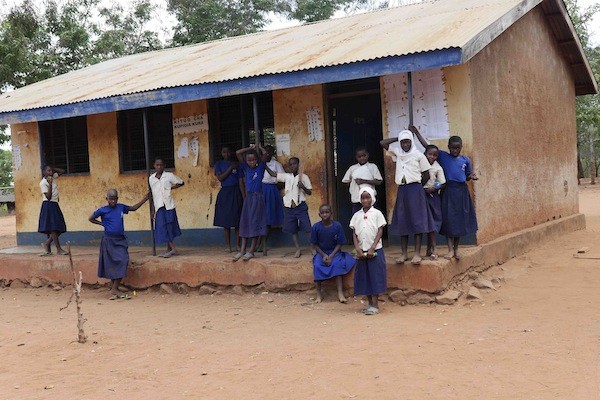
This one water well has transformed the lives of these villagers and is enabling better education and encouraging development.
WOULD YOU LIKE TO HELP PROVIDE A WATER WELL TO OTHER VILLAGES LIKE RWEJE?
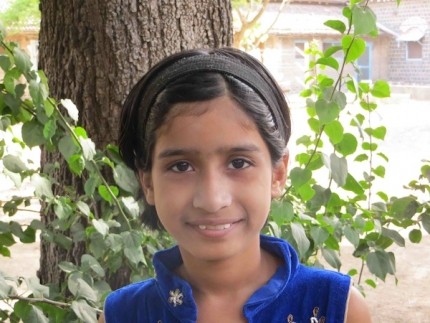
“I want her safe”, said Pari’s mother when she came to Mukti to leave her daughter. “I can not escape my lifestyle and work but I want Pari to have a choice,” her mother said determinedly as she made the decision to leave Pari at Mukti.
Pari was living in Northern India with her mother and father. The marriage of her parents was arranged by Pari’s maternal grandmother. Pari’s father took one look as his wife and fell in love. She was a very beautiful lady. Pari’s parents quickly married and moved far away from the mother’s relatives. The family was financially well off and had two girls and one boy.
Their lives seemed to be going dreamily.
Then a trip was planned to visit the mother-in-law. Upon arrival, the father knew he had been tricked. Pari’s grandmother lived in a very poor area in a very small house. He was angry, disgusted and felt tricked.
He told Pari’s mother to get out of the house and don’t come back. Two of their children stayed with their father.
She quickly called her cousin and left with Pari to live in the city. Without knowing, Pari’s mother had moved to the red light area of the city. Within a few weeks, she needed to make money for rent and began to work in the red light area. She became very concerned about Pari but found a room where she could stay while her mother worked. This worked for awhile but the boss wanted Pari out of the way and wanted Pari’s mother to focus on her work only.
Pari’s mother sought some counseling from a Christian lady. She suggested bringing Pari to Mukti Mussion. Her mother came with her boss to bring Pari. Mukti actually wanted both Pari and her mother stay for care at Mukti. Pari’s mother thought it was good for Pari but found it impossible to escape her work.
When Pari first entered the Frangipani home, she cried. Meera, her house mom, comforted her. Pari tearfully told Meera, “I will not stay”.
After a few days, Pari could see that Mukti was a safe and loving place. She is adjusting to her new home.
Pari is eight years old. She is a tall, graceful, and a quiet girl who likes to read story books.
She has made a good friend in Riya, her Frangipani sister.
Pari had never heard about God’s love for her. Today, in the Frangipani family, the love of God is demonstrated to Pari and to the others, in word and deed.
IF YOU WANT TO KNOW MORE ABOUT OUR WORK WITH MUKTI MISSION, CLICK HERE.
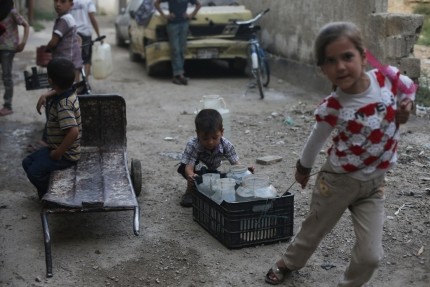
16 September 2015 – The United Nations Children’s Fund (UNICEF) has condemned in the strongest terms mortar attacks on civilian areas of Aleppo, Syria, which reportedly killed at least 19 children yesterday, including six in a UNICEF-supported child friendly space.
“Child friendly spaces enable children to play and reconnect with their childhood, and forget, even if for a short time, the horrors of war. They must never be targeted,” Hanna Singer, UNICEF Representative in Syria said in a statement.
“This reprehensible attack shows that even the simple act of playing represents a grave danger for children in Syria,” she added.
In recent weeks, several indiscriminate attacks have been reported in civilian populated areas leading to the death and injury of scores of children.
“These attacks highlight a flagrant disregard for the laws of war. They are a stark reminder that nowhere in Syria is safe for children,” Ms. Singer warned.
UNICEF is calling on all parties to the conflict in Syria to immediately halt such attacks and do their utmost to protect civilians and civilian infrastructure such as schools, health clinics and water facilities, in accordance with international humanitarian law. The agency urged that all civilians including children to be protected at all times.
In his briefing to the UN Security Council today, Under-Secretary-General for Humanitarian Affairs Stephen O’Brien highlighted the impact of the conflict on Syria’s children and young people.
“Today, Syria is one of the most dangerous places on earth to be a child,” he stated, adding that over 5.6 million children are in need of immediate assistance. In addition, children continue to be murdered, tortured and subjected to sexual violence by all parties to the conflict. “Millions of children have been traumatized by the horrors they have witnessed.”
In addition, Mr. O’Brien noted that, although the school year commenced this past week, over two million children – one out of every three – are not in school in Syria, and an additional 450,000 children are at risk of dropping out. He also expressed his concern that, in areas controlled by the Islamic State of Iraq and the Levant (ISIL), schools were using a curriculum designed by the terrorist group.
IF YOU WOULD LIKE TO KNOW HOW WE ARE COMING ALONGSIDE SYRIAN CHILDREN AND THEIR FAMILIES, CLICK HERE.
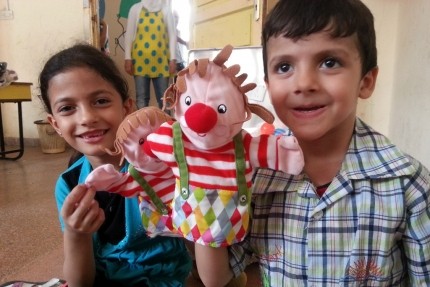
15 September 2015 – As children around the world return to school, there are more than two million in Syria who will not be able to join them, the United Nations Children’s Fund (UNICEF) cautioned today, adding that another 400,000 are at risk of dropping out of school as a direct result of conflict, violence and displacement.
With the conflict in Syria now in its fifth year, some children in Syria have never known what it is like to enter a classroom, while others have lost up to four years of their schooling, the agency noted in a news release.
“Syria’s basic public services, including education, have been stretched to the maximum,” said Hanaa Singer, UNICEF Representative in Syria. “We need to do so much more to help the education institutions from collapsing and increase opportunities for children to access education across the country.”
School buildings are also affected by the conflict; 5,000 of them cannot be used as they have been destroyed, converted into shelters for displaced families, or used as bases for armed forces, UNICEF said. Often, the schools and their surroundings are unsafe, dangerous for children to reach, and at risk of deliberate attack. To take their exams last summer, at least 20 per cent of Syria’s children were forced to cross lines of fire.
UNICEF has been working with local partners on the ground to reach around three million children, and has implemented an informal education programme to reduce the number of out-of-school children. The agency is also printing school supplies and text books locally and distributing them to students.
“Even under the worst circumstances Syrian children keep asking to learn and go back to school because they are yearning for a better future and a chance to be influential” said Ms. Singer. “We must all invest in Syria’s children as they are the future of Syria and they will help rebuild their country when peace returns.”
Under the ‘No Lost Generation Initiative,’ UNICEF is starting a self-learning programme to reach 500,000 children who missed out on years of schooling. An accelerated learning programme is also aimed at helping 200,000 children catch up with their learning and eventually reintegrate into formal education. UNICEF is also rehabilitating damaged schools and creating prefabricated classrooms to accommodate 300,000 additional children.
UNICEF requires $68 million by end of the year, of which $12 million is needed immediately in order to continue responding to children’s educational needs.
IF YOU WOULD LIKE TO KNOW HOW WE ARE COMING ALONGSIDE SYRIAN CHILDREN AND THEIR FAMILIES, CLICK HERE.
(Article Source)
